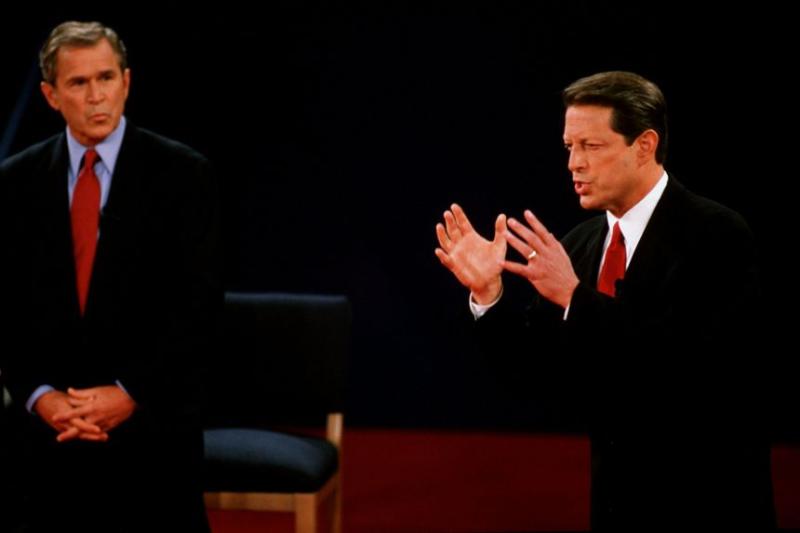'The Year That Broke America' Review: For Bitter and for Worse - WSJ
By: Barton Swaim (WSJ)



American politics went badly awry two decades ago. The combination of the 2000 presidential election, in which 537 Floridians awarded the presidency to the popular-vote loser, and the terrorist attacks of 9/11, which briefly suppressed partisan rancor, disfigured the nation's collective life in ways we could not understand at the time. Within a few years—first on the left, then on the right—accusations of criminality and treason would become an almost routine part of our political discourse.
In "The Year That Broke America," Andrew Rice has written an engaging, deftly constructed but conspicuously partisan account of the brief period that changed the United States for the worse. The book's "year" was a long one—from the time Elian Gonzalez was found off the coast of Fort Lauderdale, Fla., on Thanksgiving Day in 1999 to the moment airliners slammed into civilian targets 22 months later.
The book’s 30 chapters follow six plotlines, all of them converging in Florida: the Elián saga, which, though no one knew it at the time, likely helped to turn the 2000 election to the Republican; the travails of a black Wall Street trader named Kevin Ingram, who, having lost everything in the dot-com bubble, was arrested in a Fort Lauderdale hotel on charges of illegal arms trading; a now-forgotten radio talk-show host based in White Springs named Chuck Harder, who made a career out of predicting world-wide calamities that didn’t happen; the 9/11 terrorists from Hamburg who learned to fly in Florida aviation schools; the political ambitions of a media-savvy New York real-estate mogul operating out of Palm Beach; and the presidential campaigns of Al Gore and George W. Bush.
Mr. Rice, an editor at New York magazine, was a reporter for the New York Observer when he began covering Donald Trump’s abortive effort to win the Reform Party’s nomination in 2000. “This book started out as journalism and turned into a work of history,” he explains in his acknowledgments. With respect, I disagree. “The Year That Broke America” is journalism, not history. Mr. Rice is a gifted writer and an assiduous reporter, and his book will delight readers who share his interpretation of the events he relates. But the word “history,” at least to my old-school sensibilities, implies a greater attempt at detachment and fairness than anything found here.
Regret is the book’s dominant tone. Mr. Rice regrets bad luck, poor decision-making and partisan perfidy that, as he sees it, brought about Mr. Gore’s loss. The whole sad chain of events began when the survival of 6-year-old Elián put the Clinton administration in the impossible position of having to choose between the rule of law—sending the boy back to his father in Cuba—and acceding to the demands of, as Mr. Rice sees it, an irrational Cuban-American community that clamored for him to be allowed to stay with relatives in Florida. “As a legal matter,” the author writes, “the answer appeared straightforward. Elián’s father retained custody, and he wanted his son back.”
Wrong. There were many legally sound reasons not to send the boy back to a regime that tortured and imprisoned dissenters. Attorney General Janet Reno’s refusal to allow a Florida family court to decide the case was legally perverse and typical of her tendency to overthink simple problems. That the administration’s weak and indecisive handling of the controversy led large numbers of Cuban-Americans to vote for Mr. Bush in 2000 was a result not of bad luck but of bad judgment.
The book’s conceit that a single year “broke” the country is rather undermined by the author’s evident belief that the American right had broken it long before 2000. The “antigovernment fury” that swept Newt Gingrich and the Republicans to power in 1994, in Mr. Rice’s telling, was the same sentiment that led Timothy McVeigh to bomb a federal building in Oklahoma City the following year. Florida Gov. Jeb Bush “wanted to fix the environmental degradation of the Everglades by collaborating with his political supporters, the polluters of Big Sugar.” The 9/11 terrorists “were conspiracy theorists, drawing from the same wellspring as the American far right.” By “far right,” it soon becomes clear, he means the GOP base.
Mr. Rice sounds like a conspiracy theorist himself on the subject of the Florida recount. His sadness over the outcome is an expression, I gather, of his admiration for Mr. Gore, whom he calls “the most earnest, computer-literate public servant in the land” and “a genuine prophet—more prescient about the future than any politician of his time.” But when Mr. Rice explains how Republican officials had deliberately disenfranchised black Floridians throughout the 1990s by purging voter rolls of felons and sending “cheaper” voting machines to black-majority precincts, he sounds—how to put it?—less than entirely rational.
He insists that “in a world of flawless humans and perfectly functioning machines, Gore would have won a healthy majority of the ballots cast in Florida and thus the presidency.” That is precisely the paranoid logic—someone, somewhere must have played a dirty trick—that gave us Democratic allegations of foul play in Ohio after the 2004 election, Democratic claims that Russia had robbed Hillary Clinton of the presidency in 2016, and Stacey Abrams’s refusal to admit she lost the 2018 governor’s race in Georgia. Mr. Trump took up this conspiratorial convention with abandon in 2020, but he didn’t get the idea from Republicans. So firmly is this twisted way of thinking now entrenched in the nation’s politics that President Joe Biden, with enthusiastic nods from his party’s leaders, recently asserted that the 2022 elections would be illegitimate unless the federal government were given authority over state and local elections—which, as Mr. Biden knew, wasn’t going to happen.
Mr. Rice may be right that America broke at the turn of the century. But he is wrong about who broke it.
Mr. Swaim is an editorial-page writer for the Journal.

Tags
Who is online
59 visitors


How do we classify this book? History or opinion?
The Book is:
The Year That Broke America: An Immigration Crisis, a Terrorist Conspiracy, the Summer of Survivor, a Ridiculous Fake Billionaire, a Fight for Florida, and the 537 Votes That Changed Everything
Use the same metrics for classifying the review.
Maybe we need a new category, Opinions on History.
Mr. Gore, whom he calls “the most earnest, computer-literate public servant in the land
Someone forgot how Gore also claimed to have invented the internet.